PREVIOUS
Supreme Court Verdict on Article 370 – Part 2
March 17 , 2024
308 days
892
0
(இதன் தமிழ் வடிவத்திற்கு இங்கே சொடுக்கவும்)
Supreme Court Verdict on Article 370

Revocation of the special status of Jammu and Kashmir
- Jammu & Kashmir will no longer have the separate constitution, flag or anthem.
- The citizens of Jammu and Kashmir will not have dual citizenship.
- As the new union territory, Jammu and Kashmir will be subject to the Indian Constitution.
- Its citizens will now have the Fundamental Rights enshrined in the Indian constitution.
- Article 360, which can be used to declare a Financial Emergency, will now also be applicable.
- All laws passed by Parliament will be applicable in Jammu and Kashmir.
- It is including the Right to Information Act and the Right to Education Act.
- The Indian Penal Code will replace the Ranbir Penal Code of Jammu and Kashmir.
- Article 35A, which originates from the provisions of Article 370, stands null and void.
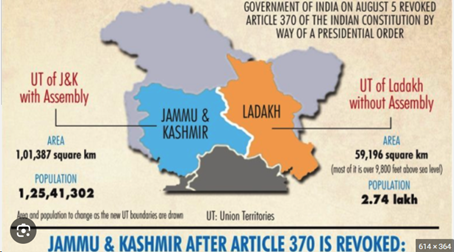
The arguments in favour of abrogation
Temporary nature
- The provision is temporary.
- Its abrogation is the ultimate step towards integration of J&K with India.
Article 14
- Article 35A discriminates against women who marry outside the State.
- It allows only the permanent residents to buy land in J&K.
- Thereby it is violating the Right to equality (Art 14).
Inclusiveness
- There is no separate flag and Constitution for J&K.
- Its meaning is that the State is no longer a separate entity from India.
Promise of restoration
- It is converted into Union Territory owing to its sensitive border State for a temporary period.
- Statehood would be restored once normalcy was established in the State.
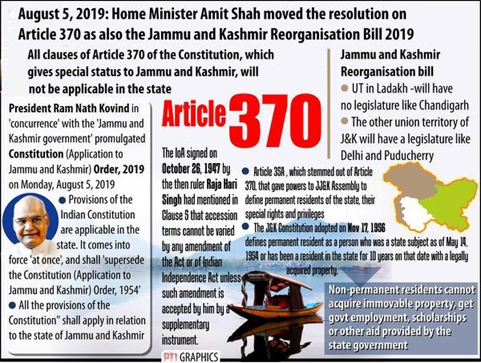
The arguments against abolition
Unique nature
- The State had a unique relationship with the Union.
- The Maharaja of J&K did not give up the internal sovereignty to the dominion of India.
Violates the doctrine of colorable legislation
- The President indirectly amended Article 370, by substituting the Constituent Assembly of J&K with the Legislative Assembly.
- The doctrine of colorable legislation means what cannot be done directly cannot also be done indirectly.
Violation of democracy
- Not ascertaining the will of the people either through its elected Government or legislature or referenda, violates the basic principle of democracy, federalism, and fundamental rights.
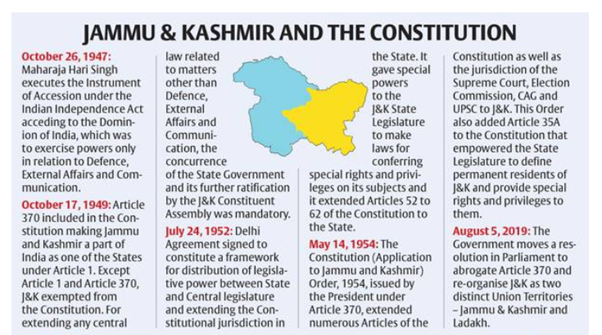
Time of abrogation
- It is said that the J&K Reorganisation Act, 2019 was unconstitutional as the declaration had been made with the concurrence of Governor at a time when J&K was under President’s rule.
Article 3
- The Centre’s decision is also said to violate Article 3 of Indian Constitution.
- Article 3 empowers the Parliament to form the new States and alter the boundaries of the existing State.
- For thus, it is mandatory for the President to refer any Bill proposing the reorganization of a State to its legislature if the Bill “affects the area, boundaries or name of any of the States”.
Constitutional Challenges
- The Presidential order had sought to abrogate Jammu and Kashmir’s special status, according to Article 370 (3).
- The President would require the recommendation of the constituent assembly of Jammu and Kashmir to make such a change.
- However, the 2019 Presidential order adds a sub-clause to Article 367, replacing the terms:
- “Constituent Assembly of Jammu and Kashmir” to mean “legislative Assembly of Jammu and Kashmir”.
- “Government of Jammu and Kashmir” to mean “Governor of Jammu and Kashmir acting on the aid and advice of the council of ministers”.
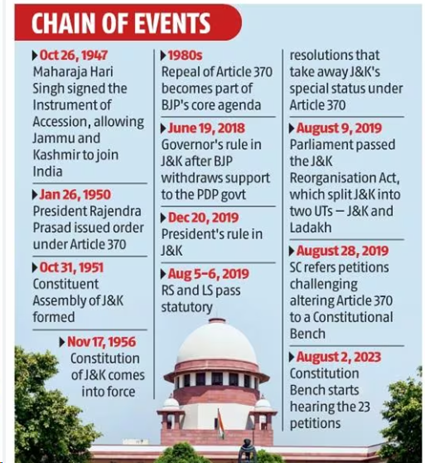
- The government sought to dilute the autonomy under Article 370 without bringing a Constitutional Amendment that would require a two-thirds majority or special majority in the Parliament.
- This provision was also challenged in the Supreme Court on the ground that it added article 35A to the Indian Constitution only through a Presidential Order.
- Conversion of Jammu and Kashmir into a Union Territory is in violation of Article 3, as the Bill was not referred to the President by the State Assembly.
- In the reorganisation of the state, the Presidential order also requires the concurrence of the government of the state.
- However, since Jammu & Kashmir is currently under the Governor’s rule, the Governor’s concurrence is deemed to be the government’s concurrence.
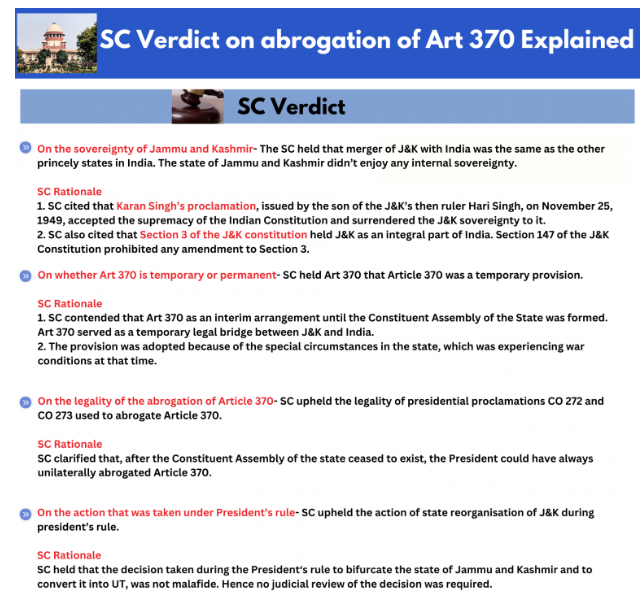
Federalism Issues
- The Instrument of Accession was like a treaty between two sovereign countries that had decided to work together.
- In Santosh Kumar v. State of J&K & others, 2017, the SC said that due to historical reasons, Jammu and Kashmir had a special status.
- In SBI v Zaffar Ullah Nehru, 2016, the SC held that Article 370 cannot be repealed without the concurrence of the Constituent Assembly of Jammu and Kashmir.
The Signs of Peace and Security in J&K After the Abrogation of Article 370
Reduction in Stone Pelting and Militancy
- Increased security presence and action by central agencies like the National Investigation Agency (NIA) led to decrease in the cases of stone pelting.
- The numbers of stone-pelting incidents are decreased from 618 in 2019 to 222 in 2020.
- Injuries to security forces are decreased from 64 in 2019 to 10 in 2021.
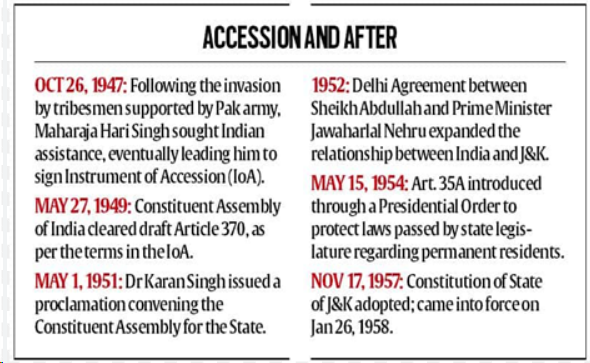
Reduction in Civilian Injuries
- Civilian Injuries from pellet guns and baton charges are reduced from 339 (2019) to 25 (2021).
- Law and Order also improved in J&K as only 20 law and order incidents were reported in 2022.
Arrests of Militants
- Arrests of militant groups are increased from 82 in 2019 to 178 in 2021.
- There has been a 32% decline in terrorist acts from August 2019 to June 2022, compared to the preceding 10 months.
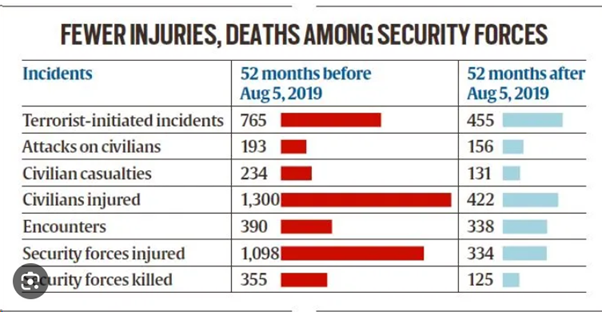
Benefits of abrogation
Integration and Development
- Article 370 hindered the complete integration of Jammu and Kashmir into the Indian Union.
- It is creating a sense of separatism and impeding its development.
- It was believed that full integration would allow for better access to resources, infrastructure, and opportunities for the people of J&K.
National Security
- Article 370 was exploited by Pakistan to support terrorism and separatism in the region.
- The abrogation would strengthen national security by allowing the Indian government to have more control over the region and crack down on terrorist activities.
Ending Discrimination
- Article 370 discriminated against women, Dalits, and other marginalized groups in Jammu and Kashmir.
- The abrogation would bring them under the umbrella of Indian law.
- It is providing equal rights and opportunities to them.
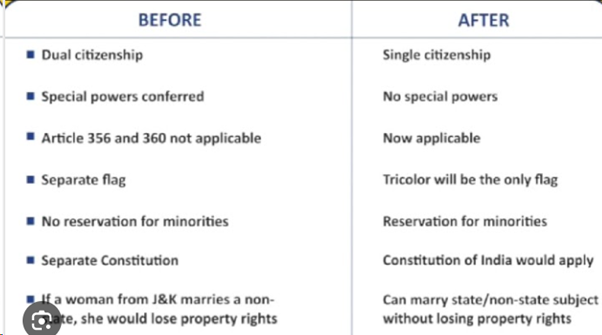
Transparency and Accountability
- Article 370 created a lack of transparency and accountability in the governance of Jammu and Kashmir.
- The abrogation would bring the state under the purview of the Central Vigilance Commission and the Right to Information Act.
- It is leading to better governance and accountability.
Economic Prosperity
- Article 370 hindered economic development in Jammu and Kashmir.
- The abrogation would allow for greater investment, tourism, and job creation in the region.
Decline in violence
- There has been a significant decline in violence in Jammu and Kashmir since the abrogation of Article 370.
- According to official data, the number of terrorist incidents has decreased by over 50% and security forces have killed over 300 militants in the last four years.
- It is including increased security measures, better intelligence gathering, and a decline in public support for militancy.
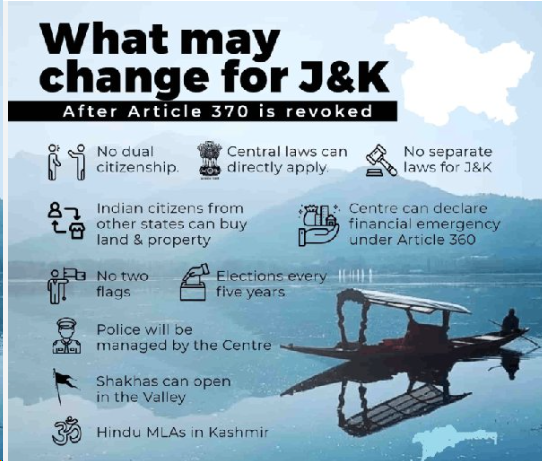
-------------------------------------
Leave a Reply
Your Comment is awaiting moderation.


